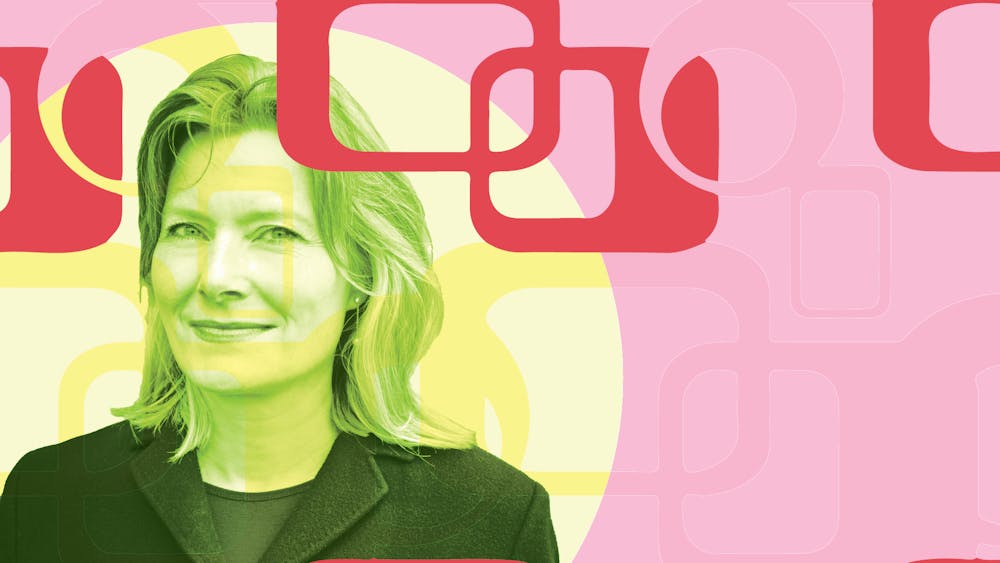It’s hard to believe that Jennifer Egan (C ‘85), six–time novelist and current president of PEN America, once doubted anything would come of her writing. Yet, for all her laurels today, Egan’s early career follows a familiar plot: Young, bright–eyed college graduate turns up in New York, only to have her hopes quashed by the big city. “I just sort of washed up as a complete mess,” recalls Egan. And for all her fellow classmates in New York, Egan felt alone.
The recipient of a prestigious Thouron Scholarship, Egan had spent the previous two years studying at the University of Cambridge and traveling throughout Europe and Asia. It was a formative period, where Egan learned the value of steady work. “I was realizing that I could be very disciplined about producing pages very regularly.” But the newly minted writer would soon realize that, when it comes to good writing, steady production doesn’t quite cut it.
“What I hadn't realized yet was that there were years of revision that would be required. So I just kind of spewed out all these pages, typed them up, and thought, you know, it's got to be great.” Enter New York; enter odd jobs and couchsurfing. And enter the humiliation of learning that the first, darling novel, product of two years, was, in fact, “horrible.”
Even as Egan was roughing it as an underpaid temp, she had to contend with less–than–favorable reactions to her early writing. “[A]s I sent [the first manuscript] to people, they either didn't respond at all and became hard to reach, or basically said, ‘I can't read it.’” Quickly losing confidence, Egan started to worry about her future as a writer.
Today, she wonders how she pulled through. “It's a little mysterious to me why I stuck it out. I just don't remember; I know I was completely spazzing out. And worrying all the time that I was basically a loser.” But stability came in the form of a job as a private secretary, and Egan, by then a veteran temp worker, finally found sufficient income to support herself.
As hard as the beginning was, Egan draws valuable insights from the time she spent as not not a starving artist. She learned, above all, to persevere through adversity. “I think humans, we underestimate how strong we are. We're tough creatures and very adaptable.” That toughness is what allowed Egan to transition from a down–and–out college student to one of the nation’s most celebrated novelists today.
Even then, her success has been incremental; it wasn't until her fourth novel, A Visit from the Goon Squad, that she reached true, mainstream fame—a fact that Egan considers for the best. Runaway success, whatever the circumstances, carries certain risks.
In Egan’s words, “There's almost nothing worse that can happen to an artist than overnight success. It's a disaster.” Instant gratification from constant praise on one hand, crippling media attention on the other—it’s no wonder so many artists who hit it big too young often fall by the wayside. Even as a level–headed, mature woman in her 40s, the sudden praise for Goon Squad caught her by surprise. With the success of this novel, Egan felt pressure like never before—a distraction from her creative practice.
“In the end,” says Egan, “the only thing that matters is to keep getting better. If you can't do that, the career is going to sputter and ultimately fade away.” And at the level of craft, if you are truly, authentically, committed to improving, patience is key. Overnight success, according to Egan, is “just not helpful in achieving that larger goal of continuing to get better.” Take note, corporate strivers.
On the other end of the spectrum, it can be tough not to get discouraged when the rejection slips pile up. How to maintain a strong inner rudder toward improvement in the face of adversity, à la Egan? The writer cautions against “protagonism,” or an excessive desire “to assert your personhood.” Rather, the key to emerging from rejection is the self–assurance that “even though in the moment, you feel that you vanished, you will come back. You're not existentially threatened.” This resolve to stand on the boundaries is an important component of any writer’s toolbox.
“Disappearing and reappearing, the ability to do that is an incredibly powerful tool” when it comes to the fiction writer’s craft. Egan sees novelists as careful observers of the everyday, capable of blending into any environment and picking up on unnoticed details. But there’s an end to all this observation, certainly in Egan’s work.
The novelist is tasked with capturing the current moment for posterity, a role that is both far–reaching and intimate; to Egan, fiction writing consists of “creating artifacts of the dream life of the culture that surrounds us.” When all of us are gone, future generations will depend on fiction to reach back into the current moment. Lucky for them, Egan has taken her convictions to heart; her imagination and eye for detail have given her the same ability to “take the stuff of daily life and transform it into something of a lot of mystery and power” that she prizes in others. And, to quote her once more, "that's art."
Jennifer Egan will be discussing her latest novel, The Candy House, on Thursday, April 7, from 5:15 p.m. to 6:30 p.m. in the Faculty Lounge (room 135) at Fisher–Bennett Hall.







